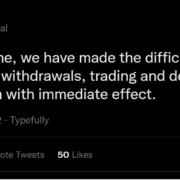Crypto Infrastructure Takes Another Hit
The scandals keep on rolling in for the crypto establishment and right on cue, the possibly most public figure in the crypto world is now facing the music.
FTX CEO Sam Bankman-Fried is in hot water as a prominent U.S. bank regulator Federal Deposit Insurance Corporation (FDIC) demanded crypto exchange FTX to halt what it called "false and misleading" claims the exchange had made about whether or not funds at the company are insured by the government.
Let’s be clear about this, crypto is not regulated and thus not insured as an asset.
The money an investor loses on a crypto exchange because of an exchange bankruptcy usually means the investors won’t get their funds back.
This is a serious risk that an investor must grapple with when pouring money into the digital gold.
This is also part of the reason why the asset class is so maligned, volatile, untrusted, and unpredictable.
The asset class also attracts scam artists who promise 1,000% returns in 7 days.
The lack of backstop in this industry deters many conservative investors and thus many crypto investors are fresh-faced with nothing to lose.
Trading with fearless abandon isn’t a great idea and is almost like hoping to win the lottery.
I have never recommended betting the family ranch on crypto and I have always advocated putting a small portion of one’s portfolio, perhaps 1-3%, into crypto.
And since November 2021, we have seen a precipitous decline in the digital asset as well as many exchanges disappearing.
There are so many concurrent federal investigations happening that I can’t keep track of them.
This is the reality of an emerging and unproven asset class.
Here’s just what happened.
The FDIC issued a cease and desist letter to FTX US that those statements implied that FDIC insurance was available for cryptocurrency and stock holdings and that the agency does not insure brokerage accounts.
In a tweet, FTX CEO Sam Bankman-Fried emphasized FTX is not FDIC-insured, and apologized if anyone misinterpreted previous comments.
The letter was not only sent to FTX as 4 others got the same letter, so this is a widespread problem in the crypto industry.
The bank regulator issued a similar cease and desist letter to bankrupt crypto firm Voyager Digital, arguing that the company had misled customers by claiming their funds with Voyager would be covered by the FDIC.
Later, the FDIC issued an advisory urging banks dealing with crypto companies to ensure that customers are aware of what types of assets are government-insured, particularly in cases where firms offer a mix of uninsured crypto products alongside insured bank deposit products.
Stocks are insured and to imply by word association that crypto is also insured shows that these exchanges are playing a dirty game.
I don’t want to paint the whole industry with one brush, but the crypto establishment isn’t doing itself any favors and their business practices smack of desperation.
No doubt that in 2022, sales have fallen off a cliff, and just look at FTX which did over $1 billion in sales last year and 2022 will end up just a fraction of that.
They are hoping to cling on to any revenue foothold even if it means misleading customers.
Crypto has a mountain to climb and this is yet another setback.






